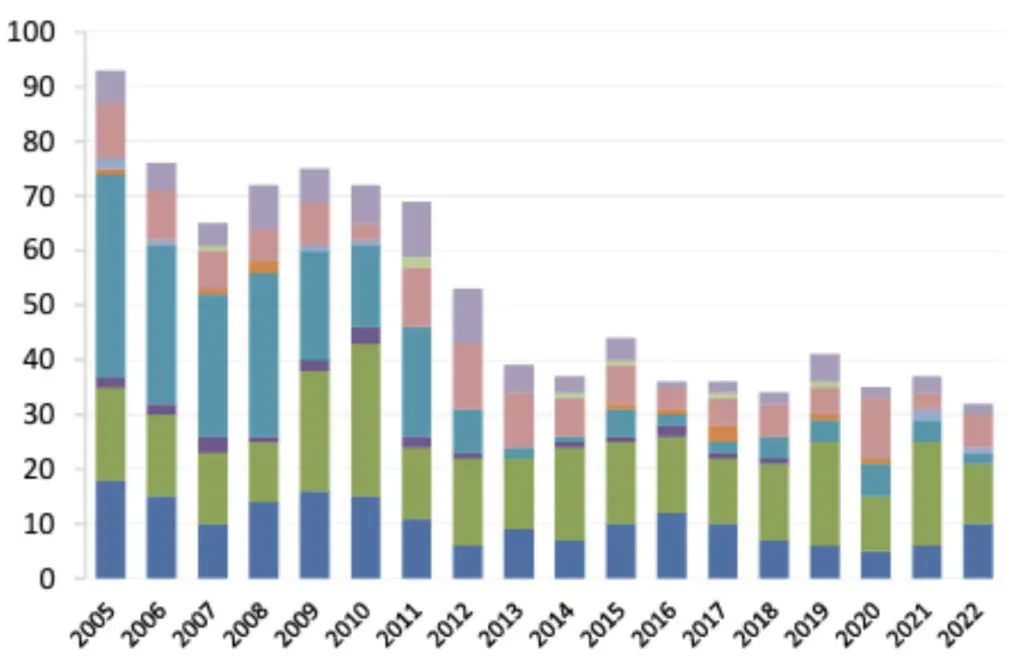The Weekly Reflektion 15/2023
The project “Development in risk level – Norwegian shelf” (RNNP) was initiated in 1999. The background for the project was the parties’ need to shed light on uncertainty related to the safety consequences caused by the major structural changes in the petroleum industry at the end of the 1990s. The ‘parties’ involved are the industry, the unions and the authorities. The RNNP is now an important process for communicating trends related to safety and includes both ‘leading’ and ‘lagging’ indicators. The Norwegian Petroleum Safety Authority (PSA) is responsible for compiling the RNNP.

*The different colours represent incidents in Defined Situations of Hazard and Accident (DSHAs)
Has the Norwegian petroleum industry reached the limit in reduction in major accident risk?
We attended the presentation on RNNP 2022 at PSA on 30thMarch. The study on well control incidents that is part of the RNNP report was carried out by Proactima and Reflekt. We hope that the discussions and the challenges identified in the study will contribute to reduction in well control incidents.
Major accident risk is a lagging indicator that looks at serious incidents and accidents within established DSHA categories, see above figure. The indicator shows that there has been no significant decrease in major accident risk since 2013. Even though the risk in 2022 was the lowest level since the RNNP was introduced, Anne Myhrvold, the director general of the PSA was not impressed. Myhrvold called on the industry to act.
“Why has progress ceased, and what can the companies do to improve further?”
The overall picture painted for 2022 by the trends in risk level in the petroleum activity (RNNP) survey is once again the same as the year before, she notes.
“This stagnation has prevailed for a long time, and it’s not good enough anymore.”
Reduction in major accident risk is of course important and we understand both the sentiments in the statements and the frustration that things are not progressing as quickly as expected. We are not however convinced that the rhetoric used by Myhrvold is the type of encouragement the industry needs to make improvements.
Is a gradual improvement in major accident risk levels ‘stagnation’? Are we subject to the law of diminishing returns where further improvements in the way we work will not yield significant reductions in the major accident risk levelmeasured in the RNNP? What is ‘good enough’ with regard tomeasured major accident risk? While we agree with the objective of ‘no more major accidents’, does this mean that the RNNP major accident risk level should be zero and that zero is the only acceptable outcome? Is zero achievable and sustainable when we consider the hazards we face, the environment we work in and the uncertainties we experience?
Reduction in major accident risk is dear to our hearts and we will use our Weekly Reflektions to hopefully ‘make a difference’.
As a final point we would like to emphasize the use of ‘we’ in this Reflektion. ‘We’ is a recognition that all parties involved in the petroleum industry need to contribute. Anne Myhrvoldissued her challenge to the ‘companies’ and yes, the companies have the responsibility for prudent operations and the greatest influence in making improvement. The authorities and the unions have also a part to play. If PSA, as the main regulator for HSE in the Petroleum industry, wants to encourage improvement and change, then PSA has todemonstrate leadership and not just wield a whip over the companies.
Reflekt will organise our first live breakfast seminar post COVID on 0800 hrs. on Wednesday 3rd May at Ipark in Ullandhaug, Stavanger. Follow our website for more details. www.reflekt.as
